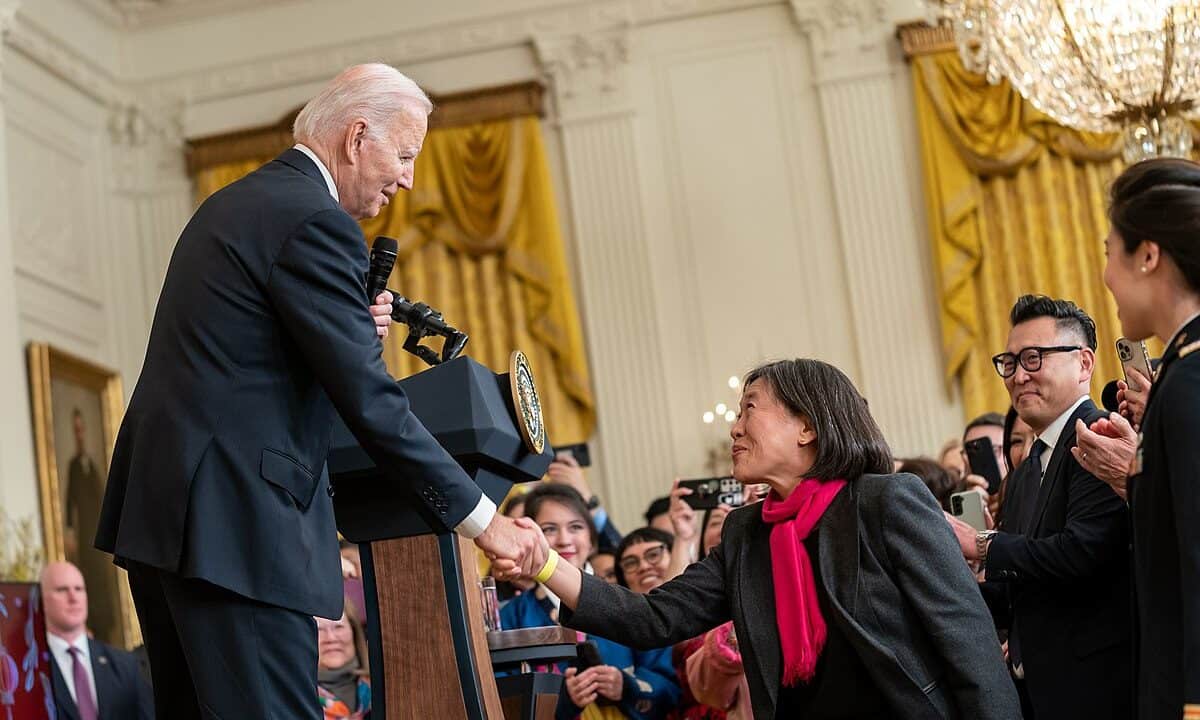 President Joe Biden greets U.S. Trade Representative Katherine Tai during his remarks at a Lunar New Year Celebration by Katie Ricks is licensed under public domain.
President Joe Biden greets U.S. Trade Representative Katherine Tai during his remarks at a Lunar New Year Celebration by Katie Ricks is licensed under public domain.
A coalition of 50 House Republicans released a letter addressed to USTR Ambassador Katherine Tai, voicing their opposition to her rescinded support for World Trade Organization (WTO) digital trade principles. By undermining the 1998 WTO moratorium on digital trade tariffs, the coalition rightly holds Ambassador Tai accountable for ceding global trade leadership to foreign rivals.
Click here to read the full letter.
Within the letter, House Republicans expressed disappointment with Ambassador Tai’s decision to withdraw support for “long standing, bipartisan core trade values” which safeguard American businesses against digital tariffs, data localization and source code disclosure. Representing over half of US service exports in 2022, the coalition championed digital trade as a cornerstone of “economic prosperity, innovation, job creation and global competitiveness.”
House Republicans highlighted the importance of unrestricted data flows for small American enterprises, citing their dependence on cloud services to navigate international supply chains. In critical industries such as manufacturing, healthcare, and agriculture, the preservation of the digital trade status-quo would ensure “the strong and resilient supply chains the Biden Administration has stated are a priority.”
According to the Congressional Research Service, US exports of digital services totaled $594 billion in 2021, representing 75% of aggregate US exported services. Furthermore, the US digital economy generated $3.7 trillion in output, or roughly 9% of US GDP, while employing over 8 million workers. By abstaining from WTO negotiations, House Republicans argue that Ambassador Tai not only “undermines the competitive edge of U.S. companies” but also transfers leadership to “strategic competitors who remain actively engaged in ongoing digital trade discussions.”
Shifting focus to US national security, the coalition asserted that digital trade serves a vital role as a “facilitator for international collaboration concerning cybersecurity and the detection of fraudulent activities.” In an increasingly digitized global economy, House Republicans stressed that free-flowing data movements were critical for the collaboration of allies, ensuring that transformative technologies such as AI “receive training from a wide range of demographic and geographic datasets.”
By retreating from WTO negotiations, the Republican coalition believes that authoritarian states such as China will “wield control over the internet and its informational access” while regulators within the European Union will “limit the free enterprise of US firms.” Lastly, the abolition of egalitarian digital trade standards could directly threaten established multinational agreements such as the United State-Mexico-Canada Agreement (USMCA), allowing the USTR to “backtrack on advancing American trade interests in other domains.”
The free-market community is in broad alignment on this issue, with 30 groups signing onto a letter organized by ATR in opposition to Biden’s dangerous agenda. This important letter, organized by Reps. Jeff Duncan (R-S.C.) and John Joyce (R-Pa.), shows that House Republicans will continue to fight against the Biden administration’s efforts to undermine America’s competitive edge on the world stage.

